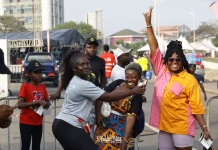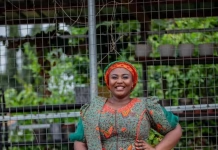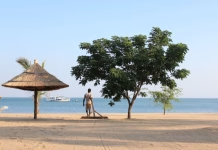
An aide to former President John Mahama, has called on the Judicial Service led by Chief Justice AninYeboah, the Ghana Bar Association (GBA), the media and civil society organizations, to look into and resoundingly rebuked Court of Appeal judge, Justice Clemence Honyenuga, for going against the ethics of his profession by openly campaigning for the re-election of President Akufo-Addo at December 2020 polls.
“I believe the Judicial Service must openly rebuke such conduct … Immediately after that story broke, I even actually called on our own party’s committee that we must petition the Chief Justice, directly; first for some sanctions, second for renewed guidelines – maybe they need to spell them out once more and spell them out clearly, and thirdly; this particular judge should not be allowed to go on in this matter; that one I insist on it; it is totally unfair to the persons being prosecuted, it is a biased perspective, it actually shows a judge caught in making a biased statement of a political kind who appeared very passionately partisan in his delivery and, so, … nobody would expect that such a judge would fairly dispense justice …”, Joyce Bawa Mogtari charged.
She also wondered, why civil society organisations are not speaking on the matter. “… I am also surprised about the quietude, first; of moral society, of the Ghana Bar Association, National Media Commission, the Ghana Institute of Journalism, National Media Foundation, of our CSOs, Christian Council; suddenly the moral voices have gone mute.

Mrs. Mogtari,was reacting to the judge’s recent endorsement of the president’s second term bid when he (the judge), in his capacity as the Paramount Chief of the Nyagbo Traditional Area known as Torgbui Ashui Nyagasi V, welcomed Mr Akufo-Addo to Golokwati, Afadzato South, during the president’s recent tour of the Oti and Volta regions.
Justice Honyenuga, who is sitting on the case between the state, on the one hand; and the former CEO of the Ghana Cocoa Board (COCOBOD), Dr. Stephen Opuni and businessman, Seidu Agongo, told President Akufo-Addo that his government’s Free Senior High School policy is unparalleled.
Speaking at a durbar of chiefs and people in honour of Mr Akufo-Addo, Torgbui Ashui Nyagasi V, told the President: “We wish to congratulate you for the excellent manner you are governing this dear country of ours, Ghana, and the significant gains made in the economy in your first term”, adding: “It is true that you have won high admiration, not only in Africa but also in advanced democracies”.
“Your flagship programmes, like the Free Senior High School, Planting for Food and Jobs – which has increased food production and has even led to exports; – One District-One Factory, among others, has (sic) increased food production and has (sic) improved upon the standard of living of many Ghanaians”, he said.
“Indeed”, he added: “For special mention is the Free SHS, which has broken boundaries and has greatly bridged the gap between the rich and the poor”, observing: “This programme has also broken the record, which was held by the first President of the Republic of Ghana, Dr Kwame Nkrumah, who gave free education to our brothers and sisters in the northern part of Ghana”.
The chief then praised the President thus: “Your Free SHS programme is unprecedented in the history of Ghana, in a first term, as it covers the whole country”, adding “We, in this district, have equally benefitted and we say ‘ayekoo’ to Your Excellency and may God and our ancestors shower their blessings on you, give you longer life and deeper thoughts to move this nation forward”.
“It is our hope that with your vision and the gains made in your first term, Ghanaians may consider giving you another four years”.
But speaking on Metro TV’s Good Morning Ghana programme on Monday, February 24, 2020, Mr Mahama’s aide, told host Randy Abbey:“I am also surprised about the quiet voices led by very distinguished individuals like OccupyGhana, individuals, who, hitherto, had interesting words of caution and advice for many individuals on even welcome addresses that were given initially, in years past, by some individuals were heavily criticised and subjected to rigorous debate about whether or not they had crossed the line and ethics of their work …
“There is an even greater responsibility on a judge or any individual who is serving currently as a judge; we’re not talking about a retired judge, about a former judge, no. You know what happened to Justice Kpegah when he made comments that people found to be against the pronouncements of a judge. We know, recently, what has happened to Justice Date-Baah, who was nominated as a distinct individual to serve on the Telecoms Tribunal … So, when you hear a judge sitting on such a matter, come out so openly, Randy, in broad daylight, in the full glare of the general public, and speak to such matters, I think first and foremost, Dr Opuni and the others I know are currently before his court, should immediately, petition the Chief Justice for him to recuse himself. Because I believe that these comments are very disparaging, they generate some disrepute, they do not augur well for the outcome of the case.
“I would also expect that the Ghana Bar Association would come out strongly to criticise, in whatever fashion, and to serve a caution to other judges who may be falling foul of the high standards required of judges”, she added.
She started by saying “ … I would want to put it in proper perspective that I’m sure that if Justice Honyenuga watches this clip of himself, reading that statement and if you watch even the faces of the persons who were sitting around him, it leaves watchers in no doubt that even they were smarting from it, they were a touch uncomfortable”.
“Randy, the second thing I would want to put out there is that: we ought to, no matter what we do, try as much as possible, to think about some very important judicial principles that in every situation that we find ourselves in, it is not just about justice being done but it must be manifestly seen to be done. It is also not the first time that you’ll see a judge sitting as a traditional ruler, but in this case, we not only have a judge, but we also have a judge who is currently sitting on cases involving some very senior political persons, specifically, politicians from the erstwhile NDC administration, who are currently standing trial for all sorts of charges, and we have this particular judge sitting on this matter.
“Randy, even to the uninitiated, to the unaided eyes, when you watch and listen to a judge of this stature, speak in such partisan terms and in such political lines, and then you are told that the same judge is also sitting on this high-profile political trials, this is a case of a judge being caught flagrante delicto – basically pants down; acting in a manner unbecoming [of a judge].
“When you are caught there – ajar, you leave no logical or reasonable conclusion in the mind of anybody watching.
“It is not even an objective welcome address, it is not a considered statement, it is not even a case for you to say that: ‘Maybe, whoever wrote the speech did not realise that the person who was going to come and read it, was not only a judge sitting on such a high-profile political case; I don’t think anybody was in any cahoots about what was going on”, the former Deputy Minister of Transport argued.
She continued: “There is a good reason why whenever applications are put in for people to serve as judges – and I’m sure you listened to the new judge who is in charge of the judiciary complaint unit who spoke at length about the fact that judges must be manifestly seen to be persons who have a high level of integrity, who have an equally modest approach to their pronouncements, especially their public utterances.
“There is also a certain expectation that the ethics of the judicial oath, will, in many ways, place on you a certain burden that disallows a judge from making comments, that will appear, first and foremost, not only sub judice – outside your remit, outside your mandate – but that seek or purport to put you or cast you in a certain light.
“We do know that judges certainly have a right to vote, and they do vote; they would certainly have their inner proclivities about whom and how or which political party they wish or intend to cast their vote for, but Randy, we have, in recent times, realised that there is a certain constitutional prohibition of chiefs, in particular, making such political statements or taking such political views, judging by the number of times that these matters have come up.
The House of Chiefs itself, has, in recent times, come up for serious criticism. If you recall, there was a matter involving TogbeAfede issuing a certain statement, the pros and cons of that conversation regarding the position taken in respect of the referendum …
“I have heard about chiefs requesting, for example, for development projects, for calling on leaders to ensure peace and stability, especially it being an election year, I have also heard about chiefs even admonishing for some perceived wrongs or allegations of wrongdoing within society.
I know chiefs who have campaigned actively against deforestation, and, of course, against galamsey and its ramifications on the environment; these are social causes that anybody within any societal remit is allowed to speak to, but when you hear a judge of the Superior Court advocate a second term for a sitting President, this was not done privately, it was not done in a tête-à-tête conversation with the said individual, the ramifications are dire”, Mogtari insisted.
She added: “And I’m sure if you listen to the President when he delivered the State of the Nation Address, he made reference to about 40 persons who are currently standing trial for all manner of charges, per se, then you have the same President visiting a community and having a judge, who happens to be sitting currently on one of these very politically-influenced cases [make those comments]”.
Mrs. Mogtari, said had the same thing happened under the Mahama administration, the narrative would have been different.
“I shudder to think of what would have happened if, under the NDC administration led by President Mahama, that a judge sitting on any matter involving any member of the then-opposition had come out so openly to make such very fluid remarks, committing his entire community; in fact, he [the judge] campaigned even more than the President on that particular occasion.
“… So, I ask: what will make a judge make those pronouncements? And you know, this is a very experienced judge, and I wonder what his own colleagues may have said to him in the aftermath; I even wonder what the Judicial Service [may have said to him].



















